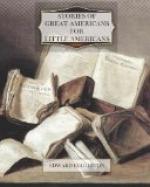Bry-ant knew his letters before he was a year and a half old. He began to write rhymes when he was a very little fellow. He wanted to be a poet. He used to pray that he might be a poet. His father printed some verses of his when he was only ten years old.
Bry-ant wrote many fine poems. Here are some lines of his about the bird we call a bob-o-link:—
Rob-ert of Lin-coln is gayly dressed,
Wearing a bright black wedding coat,
White are his shoulders and white his crest.
Hear him call in his merry note:
Bob-o’-link, bob-o’-link,
Spink, spank, spink;
Look, what a nice new coat is mine,
Sure there was never a bird so fine.
Chee, chee, chee.
[Illustration]
Haw-thorne was one of our greatest writers of stories. He was a pretty boy with golden curls. He was fond of all the great poets, and he read Shake-speare and Mil-ton and many other poets as soon as he was old enough to un-der-stand them.
Haw-thorne grew up a very hand-some young fellow. One day he was walking in the woods. He met an old gypsy woman. She had never seen anybody so fine-looking.
“Are you a man, or an angel?” she asked him.
Some of Haw-thorne’s best books are written for girls and boys. One of these is called “The Won-der Book.” Another of his books for young people is “Tan-gle-wood Tales.”
* * * * *
Pres-cott wrote beautiful his-to-ries. When Pres-cott was a boy, a school-mate threw a crust of bread at him. It hit him in the eye. He became almost blind.
He had to do his writing with a machine. This machine was made for the use of the blind. There were no type-writ-ers in those days.
It was hard work to write his-to-ry without good eyes. But Pres-cott did not give up. He had a man to read to him. It took him ten years to write his first book.
When Prescott had finished his book, he was afraid to print it. But his father said, “The man who writes a book, and is afraid to print it, is a cow-ard.”
Then Prescott printed his book. Everybody praised it. When you are older, you will like to read his his-to-ries.
Doctor Holmes, the poet, was a boy full of fancies. He lived in an old house. Soldiers had staid in the house at the time of the Revolution. The floor of one room was all battered by the butts of the soldiers’ muskets.
[Illustration]
Little Ol-i-ver Holmes used to think he could hear soldiers in the house. He thought he could hear their spurs rattling in the dark passages. Sometimes he thought he could hear their swords clanking.
The little boy was afraid of a sign that hung over the sidewalk. It was a great, big, wooden hand. It was the sign of a place where gloves were made. This big hand swung in the air. Little Ol-i-ver Holmes had to walk under it on his way to school. He thought the great fingers would grab him some day. Then he thought he would never get home again. He even thought that his other pair of shoes would be put away till his little brother grew big enough to wear them.




